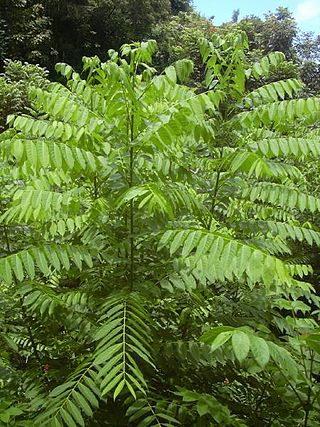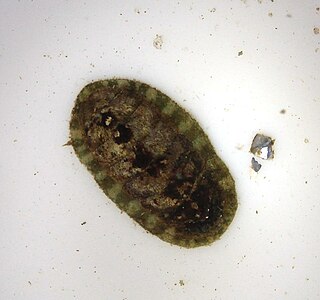
Cedrela is a genus of several species in the mahogany family, Meliaceae. They are evergreen or dry-season deciduous trees with pinnate leaves, native to the tropical and subtropical New World, from southern Mexico south to northern Argentina.

Phanias is a genus of jumping spiders that was first described by Frederick Octavius Pickard-Cambridge in 1901. They are similar to members of Marpissa, but have three pairs of spines beneath the first tibia.

Acanthospermum hispidum is an annual plant in the family Asteraceae, which is native to Central and South America. This plant is cited as a weed in cotton culture in Brazil, and it is also used as a medicinal plant. It is also naturalized in many scattered places in Eurasia, Africa, and North America It is naturalized in Australia and is a declared weed in Western Australia.

Leucaena salvadorensis is a species of flowering plant in the family Fabaceae. It is found in El Salvador, Honduras, and Nicaragua.

Ptychohyla salvadorensis is a species of frog in the family Hylidae found in El Salvador, Guatemala, and Honduras. Its natural habitats are subtropical or tropical moist montane forests, rivers, pastureland, and heavily degraded former forests. It is threatened by habitat loss.
Lonchocarpus salvadorensis, the Sangre de Chucho, is a plant species in the genus Lonchocarpus.
L. salvadorensis may refer to:

Lepidochitona is a genus of chitons. It has been included in the families Tonicellidae, Ischnochitonidae, and Lepidochitonidae.

Bidens triplinervia is a Latin American species of flowering plants in the sunflower family. It is native to Mesoamerica and South America, from Chihuahua State in northern Mexico to Jujuy Province in northern Argentina.
Salvador arboreal alligator lizard is a species of lizard found in two isolated locations in Honduras. One population in the department of La Paz and a smaller population in the department of Intibucá.
Phrynidius is a genus of beetles in the family Cerambycidae, containing the following species:
Phrynidius armatus is a species of beetle in the family Cerambycidae. It was described by Linsley in 1933.
Phrynidius asper is a species of beetle in the family Cerambycidae. It was described by Henry Walter Bates in 1885.
Phrynidius echinoides is a species of beetle in the family Cerambycidae. It was described by Breuning in 1940.
Phrynidius echinus is a species of beetle in the family Cerambycidae. It was described by Bates in 1880. It is known from Honduras, Guatemala, and Panama.
Phrynidius inaequalis is a species of beetle in the family Cerambycidae. It was described by Say in 1835. It is known from Mexico and Honduras.
Phrynidius singularis is a species of beetle in the family Cerambycidae. It was described by Bates in 1880. It is known from Mexico, Guatemala, and Honduras.

Gynura aurantiaca, called purple passion or velvet plant, is a species of flowering plant in the daisy family Asteraceae. It is native to Southeast Asia but grown in many other places as a house plant. In warm regions, it is frequently grown outdoors on patios and in gardens rather than inside buildings, and hence it has escaped into the wild in Africa, Australia, South America, Mesoamerica, Florida, and a few other places.
Lochmaeocles salvadorensis is a species of beetle in the family Cerambycidae. It was described by Franz in 1954. It is known from El Salvador.
Meizonyx is an extinct genus of megalonychid ground sloth from the Pleistocene of El Salvador and southern Mexico. The type and only species, Meizonyx salvadorensis, was described in 1985 from a mandible found in Barranca del Sisimico and other remains found at Rio Tomayate in El Salvador considered to be Middle Pleistocene in age. Later, in 2021, additional remains were described from Late Pleistocene aged deposits in Sistema Huautla, Oxaca, Mexico. It is considered closely related to Xibalbaonyx.







